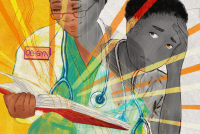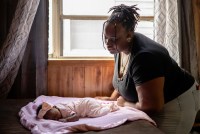Latest KFF Health News Stories
With Trump Front of Mind, New Hampshire Voters Cite Abortion and Obamacare as Concerns
New Hampshire’s primary election was dominated by voters’ feelings about Donald Trump. But health care remains a concern — and for Democrats, preserving abortion access is a priority.
What the Health? From KFF Health News: The Supreme Court vs. the Bureaucracy
The Supreme Court this week heard oral arguments in a case that could radically alter the way federal agencies — including the Department of Health and Human Services — administer laws passed by Congress. A decision in the case is expected this spring or summer. Meanwhile, the Biden administration is struggling over whether to ban menthol cigarettes — a move that could improve public health but also alienate Black voters, the biggest menthol users. Joanne Kenen of Johns Hopkins University and Politico Magazine, Lauren Weber of The Washington Post, and Rachel Cohrs of Stat join KFF Health News chief Washington correspondent Julie Rovner to discuss these issues and more. Also this week, Rovner interviews Darius Tahir, who reported and wrote the latest KFF Health News-NPR “Bill of the Month” feature about a lengthy fight over a bill for a quick telehealth visit.
Women and Minorities Bear the Brunt of Medical Misdiagnosis
Hundreds of thousands of Americans become disabled or die each year because of a diagnostic error. But some patients are at higher risk than others.
Mamografías que usan inteligencia artificial cuestan dinero extra… pero, ¿vale la pena?
Este software puede identificar patrones y anomalías que los radiólogos humanos podrían pasar por alto. Pero no es el estándar de atención.
Cómo impactaría una segunda presidencia de Trump en la atención de salud
Intentar pronosticar las prioridades de Trump en un segundo mandato es aún más difícil ya que cambia frecuentemente de posición sobre los temas, y lo hace muchas veces.
What Would a Second Trump Presidency Look Like for Health Care?
Health policy during Donald Trump’s tenure was dominated by covid-19 and a failed effort to repeal and replace the Affordable Care Act. His appointments to the Supreme Court led to the end of national abortion rights, and he took steps to increase hospital price transparency and improve care for veterans.
What Would a Nikki Haley Presidency Look Like for Health Care?
Former South Carolina Gov. Nikki Haley’s tenure in the Palmetto State — which overlapped with several tumultuous years of health care reform — and her recent comments offer clues to how her presidency might affect national health care policy.
What the Health? From KFF Health News: All About the (Government) Funding
With days to go until a large chunk of the federal government runs out of money needed to keep it operating, Congress is still struggling to find a compromise spending plan. Meanwhile, the Supreme Court agreed to hear — this year — a case that pits federal requirements for emergency treatment against state abortion bans. Alice Miranda Ollstein of Politico, Sarah Karlin-Smith of the Pink Sheet, and Tami Luhby of CNN join KFF Health News chief Washington correspondent Julie Rovner to discuss these issues and more. Also this week, Rovner interviews American Medical Association President Jesse Ehrenfeld about the choppy waters facing the nation’s physicians in 2024.
The AMA Wants a Medicare Cut Reversed – And Lawmakers To Stay Out of Care
Congress is back this week and feverishly working on a bipartisan agreement to fund the government for the rest of the 2024 fiscal year. Ahead of a potential vote, I spoke with Jesse Ehrenfeld, the president of the American Medical Association, the nation’s largest lobby group for doctors, about his organization’s priorities in Washington. Some […]
California Offers a Lifeline for Medical Residents Who Can’t Find Abortion Training
Abortion restrictions in 18 states have curtailed access to training in skills that doctors say are critical for OB-GYN specialists and others. A new California law makes it easier for out-of-state doctors to get experience in reproductive medicine.
Mammography AI Can Cost Patients Extra. Is It Worth It?
Artificial intelligence software to aid radiologists in detecting problems or diagnosing cancer has been moving rapidly into clinical use, where it shows great promise. But it’s a turnoff for some patients asked to pay out-of-pocket for technology that’s not quite ready for prime time.
¿Pueden los médicos de familia salvar a las zonas rurales de la crisis de obstetras?
El número de bebés que murieron antes de cumplir su primer año aumentó el año pasado; y más de la mitad de los condados rurales no tienen servicios hospitalarios para partos.
Can Family Doctors Deliver Rural America From Its Maternal Health Crisis?
Family medicine doctors already deliver most of rural America’s babies, and efforts to train more in obstetrics care are seen as a way to cope with labor and delivery unit closures.
What the Health? From KFF Health News: 2023 Is a Wrap
2023 was another busy year in health care. As the covid-19 pandemic waned, policymakers looked anew at long-standing obstacles to obtaining and paying for care in the nation’s health care system. Meanwhile, abortion has continued to be an issue in much of the nation, as states respond to the Supreme Court’s 2022 decision overturning the constitutional right to the procedure. This week, Rachel Cohrs of Stat, Sandhya Raman of CQ Roll Call, and Joanne Kenen of Johns Hopkins University and Politico Magazine join KFF Health News chief Washington correspondent Julie Rovner to discuss these issues and wrap up the year in health. Also this week, Rovner interviews KFF Health News’ Jordan Rau about his joint KFF Health News-New York Times series “Dying Broke.”
New Doula Benefit ‘Life-Changing’ for California Mom
Doulas, independent workers who act as advocates for birthing parents, have been shown to help prevent pregnancy complications and improve the health of both mothers and babies. California’s Medicaid program started covering their services this year, but some doulas say bureaucratic obstacles and inadequate pay prevent their effective use.
What the Health? From KFF Health News: Abortion and SCOTUS, Together Again
The Supreme Court agreed this week to hear its first major case on abortion since overturning Roe v. Wade — one that could restrict the availability of the abortion pill mifepristone, even in states where abortion remains legal. Meanwhile, on Capitol Hill, lawmakers in the House and Senate finally moved to renew health programs that expired in October — but it’s likely too late to finish the job in 2023. Alice Miranda Ollstein of Politico, Riley Griffin of Bloomberg News, and Lauren Weber of The Washington Post join KFF Health News chief Washington correspondent Julie Rovner to discuss these issues and more. Also this week, Rovner interviews Jen Golbeck, a University of Maryland professor and social media superstar, about her new book, “The Purest Bond,” which lays out the science of the human-canine relationship.
Republicans Once Championed Public Health. What Happened?
It wasn’t that long ago that Republicans were all-in on boosting public health spending. “The highest investment priority in Washington should be to double the federal budget for scientific research,” former House Speaker Newt Gingrich (R-Ga.) wrote in a 1999 op-ed in The Washington Post. Big spending increases for the National Institutes of Health soon […]
Being Black and Pregnant in the Deep South Can Be a Dangerous Combination
Being Black has always been dangerous for pregnant women and infants in the South. And researchers say things are continuing to move in the wrong direction.
What the Health? From KFF Health News: Democrats See Opportunity in GOP Threats to Repeal Health Law
Sensing that Republicans are walking into a political minefield by threatening once again to repeal the Affordable Care Act, the Biden administration is looking to capitalize by rolling out a series of initiatives aimed at high drug prices and other consequences of “corporate greed in health care.” Meanwhile, the Supreme Court hears a case that could determine when and how much victims of the opioid crisis can collect from Purdue Pharma, the drug company that lied about how addictive its drug, OxyContin, really was. Alice Miranda Ollstein of Politico, Anna Edney of Bloomberg News, and Rachana Pradhan of KFF Health News join KFF Health News chief Washington correspondent Julie Rovner to discuss these issues and more. Also this week, Rovner interviews Dan Weissmann of KFF Health News’ sister podcast, “An Arm and a Leg,” about his investigation into hospitals suing their patients over unpaid bills.
Grassroots College Networks Distribute Emergency Contraceptives on Campus
Peer-to-peer efforts can meet a clear need among students whose colleges may not make sexual health products accessible or affordable.


















